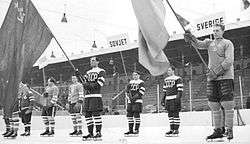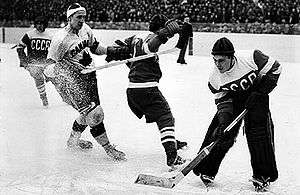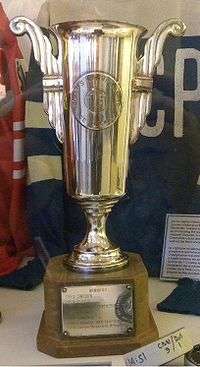1954 Ice Hockey World Championships
The 21st Ice Hockey World Championships and 32nd European ice hockey championships were held from 26 February to 7 March 1954 in Stockholm, Sweden. Every team played each other once with the top three finishers receiving medals at the end. The USSR won in its first attempt, led by Vsevolod Bobrov who was recognized as the best forward of the tournament in the first ever presentation of Directorate Awards.
 Opening ceremony | |
| Tournament details | |
|---|---|
| Host country | |
| Dates | 26 February–7 March |
| Teams | 8 |
| Final positions | |
| Champions | |
| Runner-up | |
| Third place | |
| Fourth place | |
| Tournament statistics | |
| Matches played | 28 |
| Goals scored | 222 (7.93 per match) |
| Attendance | 148,399 (5,300 per match) |
| Scoring leader(s) | |
← 1953 1955 → | |
Description

The USSR won their first five games before meeting up with the host, and defending champion, Sweden. Sweden, having already lost eight to nothing to Canada, desperately needed to beat the Soviets, but settled for a one all tie. The final game of the tournament pitted the East York Lyndhursts, representing Canada, against the USSR, both teams being undefeated. Tournament organizers believed the Canadians would cruise to their seventh straight win and had begun to sell tickets for a planned tie-breaking game between the Soviets and Swedes to determine the European Championship.[1][2] However the Soviets "appeared to pass too much, check too little, and skate too fast"[1] and "thoroughly dominated" in a 7–2 win before 16,000 fans.
Beginning with this year the IIHF began giving out official awards (known as the "directorate awards") to the best forward, defensemen, and goaltender, of the tournament.
Final round
| 26 February | Czechoslovakia | 7–1 |
| 26 February | Soviet Union | 7–1 |
| 26 February | Sweden | 10–1 |
| 27 February | Canada | 8–1 |
| 27 February | Soviet Union | 7–0 |
| 27 February | Czechoslovakia | 9–4 |
| 28 February | Canada | 8–0 |
| 28 February | Switzerland | 3–3 |
| 28 February | Sweden | 5–3 |
| 1 March | Czechoslovakia | 12–1 |
| 1 March | Soviet Union | 6–2 |
| 1 March | Sweden | 0–8 |
| 2 March | Finland | 2–0 |
| 2 March | Soviet Union | 5–2 |
| 2 March | Sweden | 6–3 |
| 3 March | Czechoslovakia | 7–1 |
| 3 March | Canada | 8–1 |
| 3 March | Soviet Union | 4–2 |
| 4 March | Switzerland | 2–3 |
| 4 March | Canada | 20–1 |
| 4 March | Sweden | 4–0 |
| 5 March | West Germany | 5–1 |
| 5 March | Canada | 5–2 |
| 5 March | Sweden | 1–1 |
| 6 March | Finland | 3–3 |
| 6 March | Sweden | 4–2 |
| 7 March | West Germany | 7–1 |
| 7 March | Soviet Union | 7–2 |
Standings

| Rank | Team | GP | Wins | Ties | Losses | Goals | Goal Diff. | Pts. |
|---|---|---|---|---|---|---|---|---|
| 1 | 7 | 6 | 1 | 0 | 37:10 | +27 | 13 | |
| 2 | 7 | 6 | 0 | 1 | 59:12 | +47 | 12 | |
| 3 | 7 | 5 | 1 | 1 | 30:18 | +12 | 11 | |
| 4 | 7 | 4 | 0 | 3 | 41:21 | +20 | 8 | |
| 5 | 7 | 2 | 1 | 4 | 22:32 | −10 | 5 | |
| 6 | 7 | 1 | 1 | 5 | 12:52 | −40 | 3 | |
| 7 | 7 | 0 | 2 | 5 | 15:34 | −19 | 2 | |
| 8 | 7 | 1 | 0 | 6 | 6:43 | −37 | 2 |
Team members
|
|
|
|
Tournament awards
- Best players selected by the directorate:
- Best Goaltender:
.svg.png)
- Best Defenceman:

- Best Forward:
.svg.png)
- Best Goaltender:
European Championships final rankings
Citations
- Duplacey P. 503
- Tournament summary
References
- Complete results
- Duplacey, James (1998). Total Hockey: The official encyclopedia of the National Hockey League. Total Sports. pp. 498–528. ISBN 0-8362-7114-9.
- Podnieks, Andrew (2010). IIHF Media Guide & Record Book 2011. Moydart Press. p. 134.
External links
- The event at SVT's open archive (in Swedish)